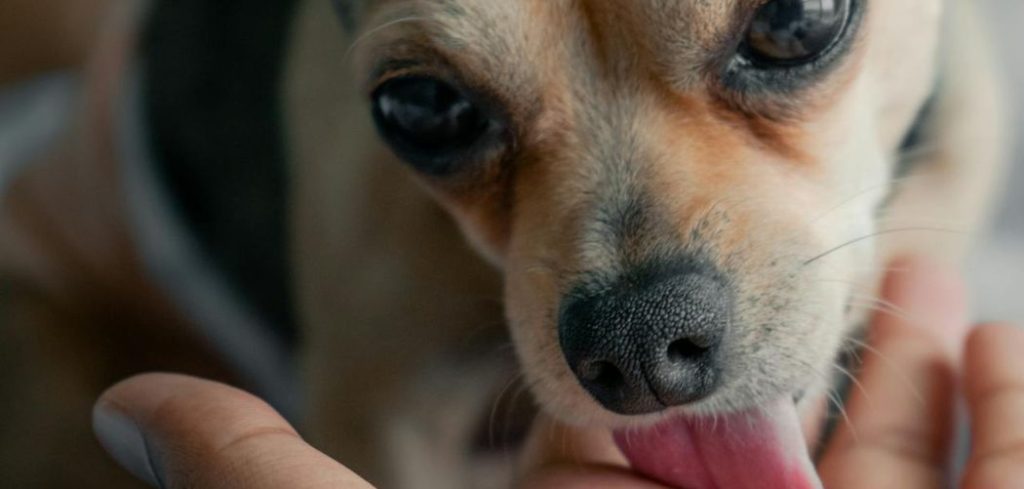A dog hacking cough accompanied by frequent licking can be alarming. While occasional licking after coughing can be harmless, persistent or excessive licking often indicates an underlying problem.
We outline the common reasons why a dog may have a hacking cough and lick, what you can do at home, and when to seek veterinary help.
Dog Hacking Cough and Licking: Why It Happens
A dog hacking cough and licking happens when irritation or inflammation affects the throat, trachea, or digestive system. Conditions such as infections, allergies, heart problems, or even dental issues can trigger coughing, while licking may occur to soothe discomfort or remove mucus.
Some dogs also lick after coughing due to nausea, especially when the cough is persistent.

Dog Hacking Cough and Licking: Common Causes
Gastroesophageal Reflux
Gastroesophageal reflux, or acid reflux, can lead to coughing and licking behaviors. Acid from the stomach irritates the throat and airway, causing a dog to hack and then lick to soothe the burning sensation.
Signs may include regurgitation, excessive drooling, and discomfort after meals. Chronic reflux can damage the esophagus and airways, making prompt veterinary diagnosis and management essential.
Kennel Cough
Kennel cough is a highly contagious respiratory infection that inflames the trachea and bronchi, causing a harsh, hacking cough.
Dogs often gag or retch after coughing, which can trigger licking as a natural response to throat irritation. While most cases are mild and resolve on their own, puppies, older dogs, or those with compromised immune systems may require veterinary treatment to prevent secondary infections.
Read more: Dog Hacking Cough Mucus (Understand why mucus causes coughing)
Heart Disease
Certain heart conditions, especially congestive heart failure, can contribute to coughing due to fluid accumulation in the lungs or airway irritation.
Dogs may lick their lips or paws after coughing, often in response to nausea or dry mouth from medication.
Other signs include fatigue, difficulty breathing, or coughing at rest. Early detection is crucial, as untreated heart disease can rapidly affect a dog’s health.
Allergies
Airborne allergens and irritants like pollen, dust, or smoke can inflame the airways and throat, producing a hacking cough.
Dogs may lick their lips or paw at their mouths to manage the irritation. Additional signs include watery eyes, sneezing, or seasonal flare-ups.
Minimizing exposure to triggers and using air purifiers or allergen-free bedding can help reduce symptoms.
Collapsing Trachea
A collapsing trachea occurs when the cartilage rings in the windpipe weaken, causing airway collapse during coughing or exertion.
The resulting irritation may lead to hacking coughs followed by licking as the dog tries to soothe the throat. Small and toy breeds are particularly prone.
You may notice a honking cough, gagging, or increased coughing during excitement. Veterinary intervention can include medication, harness adjustments, and lifestyle modifications.
Respiratory Infections and Pneumonia
Viral or bacterial infections in the upper or lower respiratory tract can produce persistent coughing with mucus and post-cough licking.
Pneumonia, a more severe lung infection, can cause labored breathing, lethargy, and green or yellow mucus.
Dogs often lick their lips to clear mucus or ease throat discomfort. Prompt veterinary evaluation is critical to avoid complications and ensure proper treatment with antibiotics or supportive care.
Read more: Dog hacking cough and spitting up (Why it happens)
What to Do If Your Dog Has A Hacking Cough and Licking
Observe your dog’s coughing patterns, licking frequency, and any associated symptoms such as nasal discharge, lethargy, or appetite changes.
Keep your dog in a calm environment and reduce exposure to smoke, dust, and other irritants that can worsen airway inflammation. Use a humidifier in dry environments to ease coughing and soothe throat irritation.
Ensure your dog remains hydrated, as water can help thin mucus and reduce discomfort. Offer small, frequent meals if reflux is suspected, and avoid feeding right before vigorous play.
Monitor for improvement over a few days, and keep a log of symptoms to provide detailed information to your veterinarian if needed.
Avoid giving human medications for cough or nausea, as they may be unsafe for dogs. Consider elevating feeding bowls or using specialized harnesses to reduce pressure on the trachea in dogs with collapsing trachea or airway sensitivity. Gentle encouragement and patience during recovery can help your dog feel more comfortable.
When to Call or Visit Your Vet
Seek veterinary care if your dog exhibits persistent or worsening coughing with frequent licking, difficulty breathing, bluish gums, or nasal discharge that is green or bloody. If your dog shows signs of lethargy, fever, vomiting, or loss of appetite, consult a veterinarian immediately.
Your veterinarian may recommend diagnostic tests such as chest X-rays, throat swabs, blood work, or heart evaluations to determine the underlying cause. Early intervention is essential to prevent worsening respiratory problems, chronic irritation, or complications from heart or digestive disease.
Related: Dog hacking cough and panting (What it means)
Key Takeaway
A dog hacking cough accompanied by licking can indicate irritation, infection, heart problems, or digestive issues.
Close observation, environmental management, hydration, and timely veterinary evaluation are crucial.
Even if symptoms seem mild, persistent coughing combined with frequent licking should be taken seriously, as early detection and treatment ensure your dog stays healthy, comfortable, and happy.
